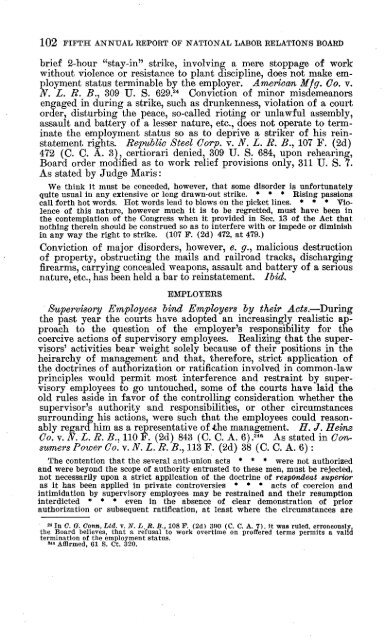NATIONAL LAB RELATIONS BOARD - National Labor Relations ...
NATIONAL LAB RELATIONS BOARD - National Labor Relations ...
NATIONAL LAB RELATIONS BOARD - National Labor Relations ...
Create successful ePaper yourself
Turn your PDF publications into a flip-book with our unique Google optimized e-Paper software.
102 FIFTFI ANNUAL REPORT OF <strong>NATIONAL</strong> <strong>LAB</strong>OR <strong>RELATIONS</strong> <strong>BOARD</strong>brief 2-hour "stay-in" strike, involving a mere stoppage of workwithout violence or resistance to plant discipline, does not make employmentstatus terminable by the employer. American Mfg. Co. v.N. L. R. B., 309 U. S. 629. 24 Conviction of minor misdemeanorsengaged in during a strike, such as drunkenness, violation of a courtorder, disturbing the peace, so-called rioting or unlawful assembly,assault and battery of a lesser nature, etc., does not operate to terminatethe employment status so as to deprive a striker of his reinstatementrights. Republic Steel Corp. v. N. L. R. B., 107 F. (2d)472 (C. C. A. 3), certiorari denied, 309 U. S. 684, upon rehearing,Board order modified as to work relief provisions only, 311 U. S. 7.As stated by Judge Mans:We think it must be conceded, however, that some disorder is unfortunatelyquite usual in any extensive or long drawn-out strike. * * * Rising passionscall forth hot words. Hot words lead to blows on the picket lines. * * * Violenceof this nature, however much it is to be regretted, must have been inthe contemplation of the Congress when it provided in Sec. 13 of the Act thatnothing therein should be construed so as to interfere with or impede or diminishin any way the right to strike. (107 F. (2d) 472, at 479.)Conviction of major disorders, however, e. g., malicious destructionof property, obstructing the mails and railroad tracks, dischargingfirearms carrying concealed weapons, assault and battery of a seriousnature, etc ., has been held a bar to reinstatement. Ibid.EMPLOYERSSupervisory Employees bind Employers by their Acts.—Duringthe past year the courts have adopted an increasingly realistic approachto the question of the employer's responsibility for thecoercive actions of supervisory employees. Realizing that the supervisors'activities bear weight solely because of their positions in theheirarchy of management and that ? therefore, strict application ofthe doctrines of authorization or ratification involved in common-lawprinciples would permit most interference and restraint by supervisoryemployees to go untouched, some of the courts have laid theold rules aside in favor of the controlling consideration whether thesupervisor's authority and responsibilite„s, or other circumstancessurrounding his actions, were such that the employees could reasonablyregard him as a representative of the management. H. J. HeinzCo. v. N. L. R. B., 110 F. (2d) 843 (C. C. A. 6). As stated in ConsumersPower Co. v. N. L. R. B., 113 F. (2d) 38 (C. C. A. 6) :245The contention that the several anti-union acts * * * were not authorizedand were beyond the scope of authority entrusted to these men, must be rejected,not necessarily upon a strict application of the doctrine of respondeat superioras it has been applied in private controversies * * * acts of coercion andintimidation by supervisory employees may be restrained and their resumptioninterdicted " * * even in the absence of clear demonstration of priorauthorization or subsequent ratification, at least where the circumstances are• 24 In C. G. Conn, Ltd. V. N. L . R. B., 108 F. (26) 390 (C. C. A. 7). it was ruled, erroneously,the Board believes, that a refusal to work overtime on proffered terms permits a validtermination of the employment status.24. Affirmed, 61 S. Ct. 320.
















